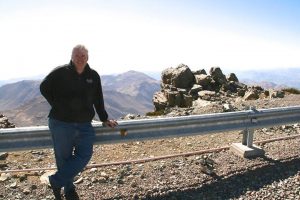Aaron Roodman has developed and commissioned the DECam Active Optics System – which uses images of stars to focus and align the camera. He spent many weeks on the mountain commissioning DECam in 2012. Since then, he’s been studying, and optimizing, the focus and alignment on the instrument. Most recently, he’s been working with the astronomers and engineers at CTIO to optimize the shape of the 4 meter primary mirror. With his students, he is improving our understanding of the point spread function of the experiment, something of paramount importance to our scientific goals (the point spread function describes how the combinations of atmosphere, the telescope, and the camera optics distort images of stars and galaxies).
We asked Aaron a few more questions – here’s what he had to say:
What is your favorite part about being a scientist?
I get to explore the unknown!
When did you know you wanted to be a scientist?
I took a summer school astronomy class when I was 14 years old and was hooked. I decided then to become a physicist and never changed my mind.
What is your favorite book, movie, and/or TV show?
Hard to pick one, but some general favorites include…
- Books: Lord of the Rings, A Bright Shining Lie, Sherlock Holmes stories
- Movies: GoodFellas, Spartacus, Real Genius
- TV: Sopranos, Game of Thrones, The Wire
What do you think has been the most exciting advance in physics / astronomy in the last 10 years?
It’s more like 17 years, but I’d pick the discovery of the accelerating expansion.
Do you have kids? Do they want to be scientists too?
We have 3 daughters. The eldest is already out of college, she works at Twitter. The middle one is planning to teach special ed and/or work with autistic children. The youngest is definitely interested in science and math, so perhaps I’ll have one scientist daughter.
If you weren’t a scientist, what would your dream job be?
I think I’d be miserable if I weren’t a scientist!
Any advice for aspiring scientists?
Pick problems which you are passionate about.
